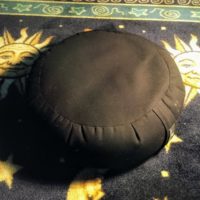 The brain has the ability to generate vivid, life-like images and scenes. It does this seemingly on its own. These scenes can appear in one’s consciousness at any moment and they can be nearly indistinguishable from reality (‘out there’ as opposed to ‘in your head’). These thoughts, in my experience, are mostly beyond ‘our’ control. They happen to us. And while we can’t prevent them, we can — with practice — observe them. See them for what they are. The analogy that best captures this for me is a Fear Hologram Projector.
The brain has the ability to generate vivid, life-like images and scenes. It does this seemingly on its own. These scenes can appear in one’s consciousness at any moment and they can be nearly indistinguishable from reality (‘out there’ as opposed to ‘in your head’). These thoughts, in my experience, are mostly beyond ‘our’ control. They happen to us. And while we can’t prevent them, we can — with practice — observe them. See them for what they are. The analogy that best captures this for me is a Fear Hologram Projector.
“Fear” because the scenarios that trouble me most involve fear and worry and anxiety. “Hologram” because these little mental vignettes are so incredibly real. I don’t know why the brain (some brains) persists in creating these but the brain in my head pulls from a lifetime of images and situations and mashes them up with the most negative of emotions and ideas.
It’s like walking down one of the endless passages in my brain and suddenly finding myself in one of these holograms. And the more mental attention I give it, the sharper and more detailed it seems. The hologram seems to need the energy of my attention to project. The fear hologram can loop endlessly for days or weeks. Or longer.
The brain can, of course, create a more positive, pleasant scenario. We like to imagine good and happy things happening. It would seem to be just as easy to create that kind of hologram as the awful kind. If ‘I’ am going to imagine some future, why wouldn’t I choose to something pleasant? The only answer I can come up with is I don’t get to choose. These mostly just happen. They come unbidden.
How do we turn off the Fear Hologram Projector?
Well, we can’t turn it off until we recognize what’s happening. We can’t see the projector when we’re in the middle of the hologram loop. The key here is probably mindfulness. Seeing what is really occurring. Not in your head but in the real, objective world around you (if you believe in such a thing). We might think of this as “experiential reality.” What we see, hear, touch, smell, taste.
When I find myself trapped in a fear hologram, it feels dark, like a movie theater. The images on the screen are more vivid in a darkened theater. And I can’t see the projector because I don’t know to look for it, or where to look.
But if I can be mindful enough to recognize I’m in a hologram — something generated by a (I choose not to say ‘my’) mind — I can bring up the house lights of my awareness! And in that instant I can see that the images are not real. They’re brain stuff. Stuff ‘I’ didn’t choose. Under the bright light of my awareness, the hologram images fade and as my awareness stops powering the projector, the images disappear. My belief, my buy-in is necessary for the hologram to exist.
I’m reminded of lines from my reading about Buddhism and Taoism.
“Am I conscious now? It troubles me that I seem so often to be unconscious. I wonder what this unconsciousness is. I cannot believe I spend most of my life in a kind of darkness. Surely that cannot be so. Yet every time I ask the question it feels as though I am waking up, or that a light is switching on.” – Ten Zen Questions
“Belief is at best an educated, informed conjecture about Reality. In contrast, seeing — raw, direct, unadulterated experience — is the direct perception of Reality Itself. […] Base your actions on what you see, rather than on what you think.” – Buddhism Plain and Simple
The bad news: our brains (okay, fuck it! My brain) have an endless capacity for materializing FHP’s (Fear Hologram Projectors), twenty-four/seven. And a lifetime of material from which to create the loops. Access to all our fears and anxieties.
The good news: it’s pretty easy to hit the house lights, spot the projector and pull the attention plug. If we can stay mindful. Of course, mindfulness doesn’t necessarily mean a state of meditative bliss. If you’re rocketing down a black ski slope; lining up for a night landing on an aircraft carrier; or in the middle of brain surgery… you’re probably not trapped on some mental fear loop. And lots of daily, less challenging tasks, can help us stay in the moment. But the mind never stops. You can hit the house lights and pull the plug on the fear projector… and find yourself back in some anxious future 30 seconds later. And this can repeat over and over, day and night.
At the risk of oversimplifying, I am either ‘awake’ or not-awake. Not-awake can take several forms, of course. There the subconscious which is probably what I’ve been talking about. How frustrating that it handles all of those life and death tasks (breathing, heart, etc) without any help from the conscious me…. and still finds time to gin up endless fear and anxiety scenarios.
Then there are dreams — which tend to be more real than the Fear Holograms — but there’s nothing we can do about those. Fortunately, mine seem to fade quickly upon awakening. And I’ve read that we also experience unconsciousness most nights. Dreamless sleep. Would like to have more of that.
I expect to be reaching for the switch to the house lights for the rest of my life. Endlessly pulling the plug on the FHP. But I find some comfort in the belief that “Thoughts think themselves.” I don’t control them. That’s the subconscious, forever and always.
And I have the cushion. Meditation. Observing the mind, allowing it to become quieter (rarely quiet). Awakening, if only for a moment.

 The brain has the ability to generate vivid, life-like images and scenes. It does this seemingly on its own. These scenes can appear in one’s consciousness at any moment and they can be nearly indistinguishable from reality (‘out there’ as opposed to ‘in your head’). These thoughts, in my experience, are mostly beyond ‘our’ control. They happen to us. And while we can’t prevent them, we can — with practice — observe them. See them for what they are. The analogy that best captures this for me is a Fear Hologram Projector.
The brain has the ability to generate vivid, life-like images and scenes. It does this seemingly on its own. These scenes can appear in one’s consciousness at any moment and they can be nearly indistinguishable from reality (‘out there’ as opposed to ‘in your head’). These thoughts, in my experience, are mostly beyond ‘our’ control. They happen to us. And while we can’t prevent them, we can — with practice — observe them. See them for what they are. The analogy that best captures this for me is a Fear Hologram Projector. I have some bad habits and a couple of good ones. Perhaps my best habit is daily
I have some bad habits and a couple of good ones. Perhaps my best habit is daily